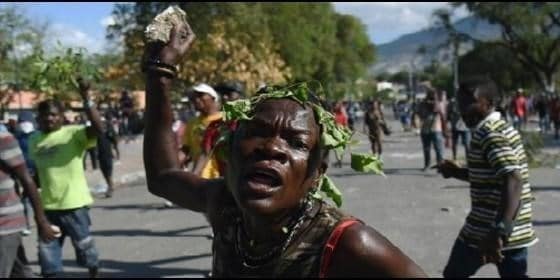Haitian Opposition Announces Resumption of Anti-government Protests


Orinoco Tribune – News and opinion pieces about Venezuela and beyond
From Venezuela and made by Venezuelan Chavistas

Port-au-Prince, Nov 15 (Prensa Latina) The Haitian opposition announced today the resumption of anti-government demonstrations, after two weeks of tense truce in the country.
The protests are called for next Monday, when they mark 216 years of the battle of Vertières, the first defeat of the Napoleonic army, which marked the independence of Haiti from France.
“We only have one weapon: the mobilization,” said the senator for Nippes, Nenèl Cassy, and stressed that the battle was already won by the people, and they will not leave the streets President Jovenel Moïse resigns.
For his part, Volcy Assad, a former senator, said that this new stage of struggle will focus especially on the North and Western departments, with the intention of preventing the movement of the president to the historic site of the battle of Vertières.
“There is no way for Jovenel Moses to stain the monuments of Vertières, bequeathed by our ancestors,” Assad said, and recalled that, last October, the head of state could not attend Pont Rouge, in this capital, where the independentist Jean Jacques Dessalines fell.
André Michel, one of the most recognized figures of the Consensus Alternative for the Refoundation of Haiti, denounced the alleged pressures exerted by certain embassies in the country so that opposition personalities negotiate the formation of a new government.
In recent days, Senator Antonio Cheramy, who led the boycott of the ratification of the Executive in Parliament, denounced the revocation of his visa to the United States as blackmail for the formation of a new administration.
Michel reiterated that the solution to the political and economic crisis requires the resignation of Jovenel Moïse, and stressed that the political battle cannot be won with debates.
Since mid-September, anti-government protests in Haiti intensified, and a large number of sectors and social organizations joined, however, Moïse insists on maintaining his position.
The head of state blamed the ‘system’ for the deep social inequalities present in the country, and suggested that he wanted to be part of the nation’s transformation.
Its detractors, meanwhile, point out that the main development indicators were precipitated by his management and criticize his inaction in core issues such as the trial against embezzlers of public funds, massacres in disadvantaged neighborhoods of the country, and the marked international interference.
mem / ane
Translated by JRE/EF